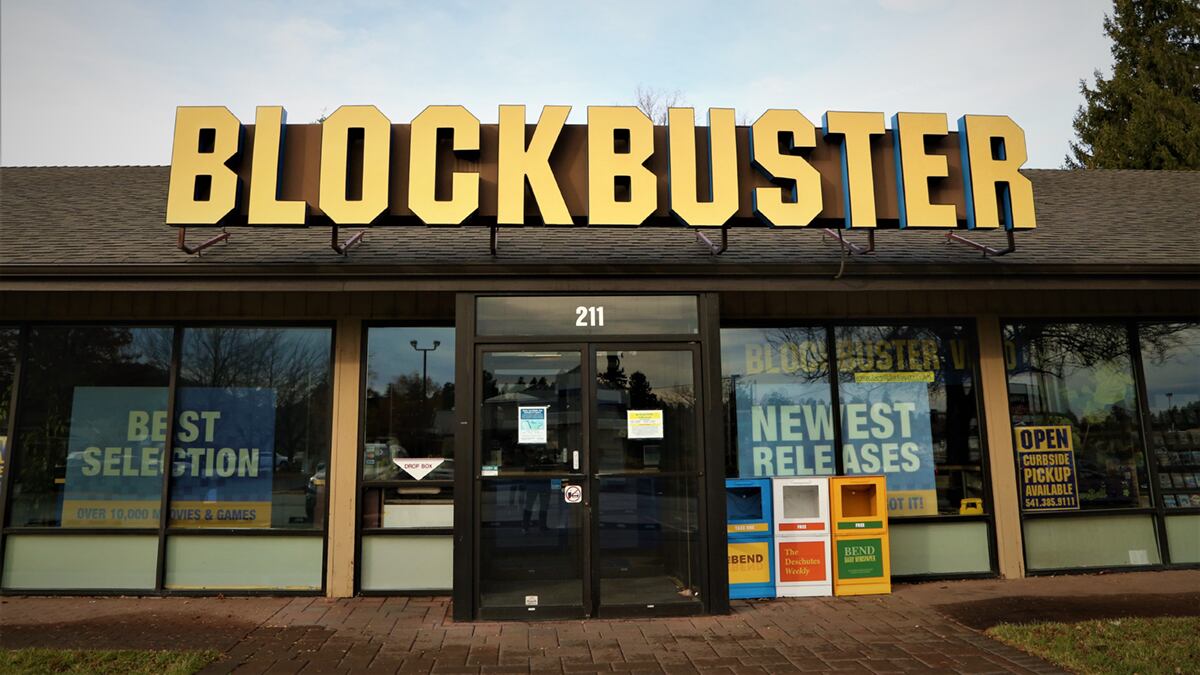To answer the most obvious question: The last Blockbuster does indeed stock The Last Blockbuster.
Taylor Morden's engaging portrait of the once-ubiquitous video giant's final extant franchise may have debuted atop the iTunes chart for streaming documentary rentals, but Bend-area viewers swinging by the sole survivor could also search the shelves for copies on DVD or Blu-ray. Later this month, following extended negotiations with (post-bankruptcy rightsholders) Dish Network to replicate the chain's gaudily branded thick, plastic storage cases, it'll also carry a VHS edition—the first official Blockbuster Exclusive since 2011.
A native Oregonian who'd formerly helmed a pair of music docs, Here's to Life: The Story of the Refreshments and Pick It Up!—Ska in the '90s, Morden spoke with WW about the humble origins of his long-standing pet project, the challenges of hosting a COVID-era premiere and the surprising ease of enlisting celebrity commentators (Kevin Smith, Ione Skye, Jamie Kennedy).
"We just had to reach out and say we were making a movie about the last Blockbuster," Morden laughed. "They all were shocked that any were still left."
WW: How did this all begin?
Taylor Morden: I'd found a Blockbuster Video here in Bend that was open and fully functional. It was like stepping through a '90s time warp. I just asked if we could bring cameras around. Nobody had taken much interest at that time—they were kind of caught off guard—and we stuck with it. Back in early 2018, as they became the last Blockbuster in the state, the country, the world, there was a huge media boom. The store became part of the zeitgeist—all over the news, the late-night shows—and we were there filming.
How long did the others stay alive?
There were still 12 Blockbusters left when we started. Honestly, the whole time, I thought for sure Alaska would be last. Everybody did. They didn't have high-speed internet, so DVDs made sense. We wanted to film up there for our ending, but interviewing their owner, he said all the stores were closing next week. They weren't making money, and we went from four Blockbusters to one very quickly.
Why was Bend's Blockbuster the last?
In part, it's just the dumb luck of other stores happening to close, but it really comes down to the people running the place. Watch the movie, you'll see manager Sandi Harding's love for the store and the kids who work there. It's not, you know, a super-profitable business—more a passion project—but, as long as the owners feel they can break even, they're going to keep providing jobs through this community hub.
How does it stay afloat?
They still sell tons of snacks—candy, Red Vines, fancy local popcorn—and they're doing a lot of sales online with T-shirts, shot glasses, souvenirs. We sell our movie poster there. Last time I asked, only about half of their revenue came from renting DVDs. There's just much more demand for getting a picture taken in front of the Blockbuster sign. There's enough memorabilia for a museum, and nostalgia's so strong right now that the store was becoming a tourist attraction.

Did you have any screenings?
With all the theaters shut down, it was a rough year to put out a movie. People tweet at us all the time now about the irony of renting the film on iTunes or watching it on Amazon. Instead of the indie-theater run we wanted, we did a handful of drive-ins. BendFilm [Festival] had a pop-up series all summer that was really cool. We played at that a few times, and our world premiere was there. That was the fun one. We sold out, I think, three screenings in a row? For us in Bend, that was the first time we'd left our houses and gathered for anything since March. It was my first time at a drive-in since the late '80s—very surreal.
Do you believe there's something intrinsically valuable about the video store?
Oh, of course. That's kind of our mission statement. We've traded so much for this sense of convenience, but what have we lost in exchange? It's a part of our culture that's slipping away. We've lost that sense of community, purpose, these physical objects that used to hold movies. Thank goodness for places like this Blockbuster and Movie Madness and, you know, the few stores hanging on.
It's not about access to the films, then?
The people we talked to about Blockbuster Video have all these fond memories of the rental experience, but almost never mention the movies. It was a date night, or the family was fighting, or they went with their grandparents, or they took the kids. Those are the things that stick out and resonate. We still have all the movies. Back to the Future II isn't gone just because the stores went away. The experience of picking it out with your family and rewinding the tape and taking it back to Blockbuster…that's what's gone.
SEE IT: The Last Blockbuster streams on Amazon Prime, Google Play, iTunes, Vudu and YouTube.
